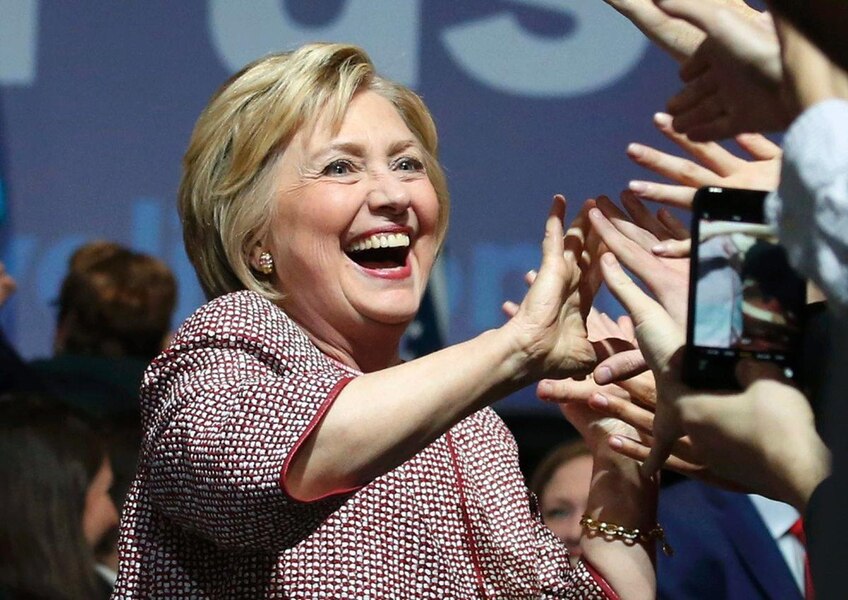
After her victory in New York, Hillary Clinton is almost guaranteed the Democratic nomination. Will Bernie Sanders continue to put a spoke in her wheels?
Hillary Clinton’s New York primary win was even greater than the polls predicted. It will allow her to widen her lead over Bernie Sanders, and take one more step toward a now practically assured victory at the Democratic convention in July.
Sanders’s Goose Is Cooked
In fact, for Sanders, the math is merciless. Here are the (approximate and unofficial) numbers. To legitimately declare himself the winner, Sanders will have to win 50 percent of the 4,051 state delegates (2,026). According to The Washington Post’s numbers, Sanders has won 1,130, while Hillary Clinton has 1,393. There are 1,528 left. To obtain a majority of elected delegates, Sanders needs to win 896 of the 1,528 remaining ones (59 percent). Can he realistically win that many of the remaining delegates? No, polls in several of the upcoming states favor Hillary Clinton. In Pennsylvania, she leads 51 percent to 38 percent; in Maryland, 57 percent to 36 percent; in New Jersey, 51 percent to 42 percent; and in California, the largest state of all, Clinton leads 51 percent to 40 percent.
To catch up, Sanders will have to campaign hard in each of those states and give it his all. But that’s what he did in New York, and he couldn’t sway voters. There is no evidence that Sanders’s efforts could bear more fruit in the remaining states and turn the tide. In other words, Bernie Sanders’s goose is, for all intents and purposes, cooked.
How Will Sanders Land the Plane?
Bernie Sanders’s team now has to find a way to softly land his campaign without losing face, demobilizing the voters he attracted, or especially without dividing the Democratic vote during the general election. It won’t be easy.
From Hillary Clinton’s point of view, the most important thing is to once and for all get rid of the thorn that is Sanders’s increasingly aggressive, negative campaign. The barely veiled accusations of corruption lobbed at Clinton because of her close relationship with her donors from the banking sector could cost Hillary Clinton dearly if Sanders continues with these attacks in the long run. He’ll also have to find a way to make people forget his allegations about the former secretary of state’s judgment or her presidential qualifications.
To not lose face or betray his supporters, Sanders must continue to keep his eyes on the prize. But if he continues with the negative, aggressive tone he used during the New York campaign, he could play right into Republican hands. In fact, Sanders and his main lieutenants will tell whoever wants to listen that the rules of the primaries are biased against the senator, which raises questions about the legitimacy of the elections. For example, Sanders complained that the New York primary only allowed people who had been registered as Democrats for several months to vote, meaning many Sanders supporters were unable to cast a ballot. The problem is, by questioning the legitimacy of Clinton’s election, Sanders is feeding the cynicism that could lead to many abstentions on Nov. 8.
Sanders’s campaign is not without its hypocrisy, either. For a long time, Sanders has repeatedly said that if he obtained the majority of delegates during the primaries, the 712 superdelegates — party members whose convention vote is separate from voters, and the majority of these superdelegates have already publicly declared their support for Clinton — should respect the wishes of voters. Yet, his campaign director stated that if Hillary Clinton won the majority of delegates after the final election on June 7, his campaign would try to tip the scales in Sanders’s favor by courting the superdelegates.
A year ago, when Bernie Sanders launched his campaign on the shores of Lake Champlain, he promised to run a different kind of campaign, without personal attacks or negativity. The battle in New York and its excesses showed that he hasn’t exactly kept his promise. The failure in New York literally closed the door on his chances for victory. He will have to rethink his strategy, or else he’ll become an ally of convenience for Donald Trump.

Leave a Reply
You must be logged in to post a comment.